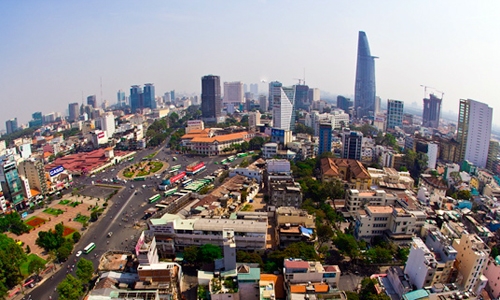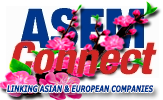
AsemconnectVietnam - To be an important content of 4th industrial revolution, using means of supporting information and communications technology (ICT) and other means contributing to enhance competitiveness, innovation, creativity, transparency, streamlining, effectiveness of urban management administrations, improving efficiency of using land, energy and resources development, raising quality of urban living environment, stimulating economic growth and socio-economic development.
SUSTAINABLE URBAN DEVELOPMENT SCHEME OF VIETNAM FOR 2018 – 2025 PERIOD AND ORIENTATIONS TO 2030
I. Viewpoints and principles
- Firstly, to be in line with guideline of the Party, laws of the State, orientations, strategies, plans and programs for socio-economic development and urban development of the country and localities, to be suitable for specific characteristics of each locality.
- Second, to be an important content of 4th industrial revolution, using means of supporting information and communications technology (ICT) and other means contributing to enhance competitiveness, innovation, creativity, transparency, streamlining, effectiveness of urban management administrations, improving efficiency of using land, energy and resources development, raising quality of urban living environment, stimulating economic growth and socio-economic development.
- Third, taking people as a center point, aiming at ensuring that all classes of the society can benefit, participate in smart urban construction, monitoring and management, contributing to implement national strategy on green growth and sustainable development objectives of Vietnam.
- Fourthly, basing on advanced scientific and technological achievements, applying modern and synchronous technologies, ensuring technology neutrality, compatibility with many platforms, ensuring network information safety, network security, protecting personal information of the people, ensuring consistency between technology and non-technology solutions.
- Fifthly, to ensure consistency, to optimize existing technical infrastructure and ICT infrastructure basing on smart urban development ICT reference framework, technical standards to ensure interactive, synchronous operation of smart metropolitan as well as intelligent urban areas; using key performance indicators (KPIs) for smart cities.
- Sixth, to organize implementation of sustainable smart urban development combining both top-down and bottom-up approaches, the central administration focuses on building regulatory systems and supporting policies, local administration plays an active role. Encourage investment participation, socialization of smart urban development on principle of calculating correctly, full cost and risk, harmonizing interests of stakeholders, encouraging use of domestic products and service. To organize pilot implementation in a typical manner, draw experiences before scaling up, fulfilling step by step with concrete advances, basing on specific characteristics of each urban area, harmonizing long term development requirements of urban areas with urgent needs of the people, ensuring short-term and long-term investment effectiveness, no spontaneous and rampant development, following movements.
- Seventh, in 2018-2025 period, to give priority to build the following basic contents: smart urban plan; smart urban construction and management; provides smart urban facilities for organizations and individuals in urban areas with basis of urban infrastructure and ICT infrastructure system, which includes smart urban spatial database which is connected and integrate two systems.
II. Objectives
1. Overall objective:
Smart urban sustainable development of Vietnam look towards green growth, sustainable development, exploitation and promotion of potentials and advantages, raising efficiency of using resources; To efficiently exploit natural resources and human resources, improve quality of life and at the same time to create favorable conditions for organizations, individuals and people to participate effectively in research and investment in construction and management of smart urban development; limiting potential risks; improving efficiency of the State management and urban services; To raise competitiveness of the economy and international integration.
2. Specific objectives:
- In a period from now to 2020: To build smart legal foundation for smart urban development, to prepare investment for pilot implementation at urban levels and urban zone levels.
+ To review and formulate a common legal framework for sustainable smart urban development, promulgate mechanisms and policies which are applicable to pilot areas;
+ To work out a master plan on development of national standard system to serve sustainable smart urban development in Vietnam;
+ To develop and implement pilot application of smart urban development ICT reference framework, build urban spatial data infrastructure, integrating land data, build on GIS and other databases; To formulate appropriate models in management of population, transport, land and construction investment in pilot urban areas; building national urban database phase 1;
+ To guide and apply system of supporting decision promulgation in urban plan;
+ To support at least 03 urban centers on approving master plan on smart urban development and organizing implementation of infrastructure investment and development of smart urban utility applications;
+ To support at least 03 new urban centers to be invested in construction and pilot application of smart urban solutions;
+ 50% of Department of Construction, Departments of Information and Communication, relevant departments and People's Committees of pilot urban areas shall be trained in smart urban development;
+ To formulate and submit for approving pilot priority programs and projects of development of smart urban centers in Mekong river delta;
+ To efficiently carry out approved objectives of national program on information technology application in operation of the State agencies in 2016-2020 period and Vietnam’s plan on development of green growth urban centers to 2030.
- In a period to 2025: To implement the first phase of smart urban development.
+ To build and perfect legal corridor and legal provisions on the basis of preliminary and final reviews of pilot implementation; implementing reference framework for smart urban development in Vietnam;
+ To announce priority national standards for pilot implementation and construction of smart urban zones, giving priority to areas of urban management, lighting, transport, water supply and drainage, collection and garbage disposal, power grids, disaster risk warning system and ICT infrastructure system;
+ To develop urban spatial data infrastructure, consolidating land data, construction and other GIS-based data in pilot cities in phase 1;
+ To pilot apply system of supporting decision promulgation in urban plan and urban plan information retrieval system in at least 3 urban centers of grade II or higher;
+ To support at least 6 urban centers / 6 economic regions to approve master plan on smart urban development and organize implementation of smart urban facilities to serve urban population; to formulate pilot centers for citizen in connection with a one-door section;
+ To pilot apply mechanism of granting certification of smart new urban center;
+ 100% of Department of Construction, Department of Communications and Information, concerned branches and the People's Committees of the pilot cities shall be trained in smart urban development;
+ To achieve approved objectives of pilot programs and projects for smart urban development in Mekong river delta;
+ To effectively implement approved objectives of green growth urban development plan of Vietnam until 2030.
- Orientation to 2030: Completing pilot phase 1, step by step replicating by field, area, forming a network of linking smart cities with potential to spread.
+ To finalize pilot mechanisms and policies, continue to perfect mechanisms and policies and apply them on a large scale;
+ To form smart urban chains in northern, central, southern region and Mekong river delta areas, taking Hanoi, Ho Chi Minh city, Da Nang city and Can Tho city as clue hubs, creating a network of smart urban links.
III. Major tasks and solutions
A. Contents of tasks and solutions
1. Group 1: To review and perfect system of legal documents, mechanisms and policies, technical and economic norms and promulgate guidelines on sustainable smart urban development.
- To formulate legal institutions, legal corridors for plan, investment, construction, management, supervision and operation of smart urban centers aiming at green growth and energy efficiency, pollution reduction, respond to climate change, civilized and culture urban, sustainable development;
- To study and develop key performance indicators (KPIs) for smart urban centers in line with international standards and specific characteristics of Vietnam;
- To study, develop and guide application of urban smart development ICT reference framework and set up a self-assessment mechanism for smart urban development level according to key KPI performance indicators;
- To guide application of ICT in management of urban technical infrastructure database, management of construction order, management of urban construction land, water supply and drainage, waste collection and treatment, green trees, underground space, ...
- To study, formulate, guide and set up financial mechanism, mechanism of supervision and allocation of responsibilities for management and implementation of smart urban development.
2. Group 2: To step by step formulate and perfect a system of national standards on smart urban areas, promote basic scientific research and studying sustainable smart urban applications.
- To review, study and promulgate a system of national standards, economic and technical standards and technical guidelines on smart urban development for management and application, ensuring synchronous and uniform connection. To ensure interconnection of technology and databases between systems and areas of the State management such as plans of urban, construction, land, transportation and population. To align with international standards at each level in accordance with realities of domestic development;
- To promulgate regulations on rights and responsibilities of confidentiality and security of smart urban data;
- To promote research into theoretical and practical issues to provide scientific arguments for smart urban building and development towards green growth and sustainable development goals;
- To promote creativity, invention and protection of intellectual property related to field of smart urban development;
- To encourage research and development of smart urban plan, smart urban management applications (urban infrastructure management, transportation, health care, education, early warning systems and other areas), smart urban utilities to serve organizations, individuals and communities in urban areas;
- To develop e-commerce solutions implemented by organizations and individuals along with perfecting mechanisms and policies for managing new financial transactions in network environment.
Group 3: Formation, interconnection, maintenance and operation of digital urban spatial data system and national urban database.
- To build and develop a system of urban database and urban spatial data system, step by step upgrading according to urban, regional and national levels;
- To implement and apply ICT in management of urban technical infrastructure database, construction order management, urban construction land management, water supply and drainage management, management of waste collection and treatment, greenery, water and natural landscape, management of urban underground space and other fields;
- To enhance capacity of security protection, information safety, troubleshooting.
4. Group 4: Promote application of smart technology in urban development plan and management.
- To develop smart applications to support decision making in formulation, evaluation and publicization of urban plan;
- To develop a system for providing plan information and receiving feedback from community, management and supervision of implementation of urban plan;
- To implement theory and methods of plan and management of urban development.
5. Group 5: Development of smart urban infrastructure.
a/ Investment and development of smart urban technical infrastructure, in short time, priority should be given to investment in the following fields:
- To develop smart urban lighting;
- To develop smart traffic development, guidance systems for people involved in traffic, commanding control and handling of emergency response;
- To develop smart water supply and drainage systems, ensuring ability to control and treat pollution and quality safety;
- To develop a smart urban waste collection and treatment system;
- To develop smart grid;
- To develop warning system of risk and natural disaster.
b) Development of information and communication technology (ICT) infrastructure
- To develop centralized and multi-task information processing centers;
- To develop ICT infrastructure of urban areas;
- To enhance universality of using, connecting smart terminals.
6. Group 6: Development of smart utilities for urban residents.
- To form smart and convenient public utilities for people;
- To strengthen application of information technology to public social safety management, environmental monitoring, crime prevention and other social management fields in parallel with protection of freedom and personal information, controlling use of personal data;
- To accelerate deployment of e-commerce applications, notify and permit use of online payment for services of urban residential;
- To formulate centers for citizen connection in association with one-door section, perfecting mechanisms to support and encourage online service models on online education and training, employment, health care, urban culture, entertainment and other utilities;
- To develop facilities to warn people about risks, natural disasters, epidemics and other issues of high magnitude.
7. Group 7: Building potential for sustainable urban development.
a) Training, retraining and development of human resources
- To build, foster development of capacity, skills, roles and responsibilities of smart citizens;
- To integrate and develop smart urban training contents at university level and postgraduate level in training programs of relevant fields, including urban plan, architecture, construction communications, urban technical infrastructure, construction equipment, urban, electricity, water, urban management and other training disciplines;
- To build and integrate contents of sustainable smart urban development in program of training and fostering in raising management capacity of urban construction and development, applicable to urban centers of grade III or higher in a period of 2018-2025.
b) To develop research, manufacture and application of smart urban science and technology
- To promote innovative start-ups, build networking platforms, encouraging exchange of experience, knowledge, supporting start-up projects in smart urban related fields, response to climate change and sustainable development;
- To encourage socialization and investment of enterprises in order to form and develop centers, research centers and experiments on smart urban technology transfer and green growth;
- To build a network of cooperation between training establishments, research institutes, centers, enterprises and municipalities. Form closed chain of training - research - production - application;
- To raise domestic capability in research, development, manufacture and market of intelligent hardware and software products;
- To study and develop construction materials, equipment and facilities, urban facilities and equipment and advanced construction technologies using energy saving and environmentally friendly technologies.
8. Group 8: Strengthen mobilization of investment capital, technical assistance at home and abroad.
- To diversify domestic and foreign investment capital sources, apply PPP and other investment models to make in-depth investment in construction of material and technical foundations, training establishments to study and modernize laboratory equipment, invest in intelligent urban infrastructure and equipment to serve urban management and carry out other tasks of the scheme;
- To step up and attract funding sources for technical assistance and international cooperation in order to develop research into and effectively apply technologies for smart urban development solutions;
- To promulgate priority mechanisms and policies on tax, credit, land and other preferences in order to encourage participation of members in smart urban development.
9. Group 9: Actively promote international cooperation, exchange of technology transfer on sustainable smart urban development.
- To enhance cooperation and exchanging information on intelligent urban development with other countries and international organizations;
- To take advantage of assistance to promote integration of international organizations in smart urban development, to cooperate in implementation of research topics and projects aimed at developing human resources as well as accessing advanced technologies.
- To study and formulate legal bases and favorable conditions for Vietnam to commit itself to and actively participate in activities of the ASEAN community and international community on smart urban development;
- To join international forum on smart urban development to catch up on the world's new trends in smart urban development and assessment.
10. Group 10: Propaganda and popularization of smart urban awareness:
- Promote communication activities to raise awareness of the State management agencies, socio-economic components and community about role and benefits of smart cities; propagandizing on mass media about role and meaning of smart urban centers, encouraging active participation;
- To promote diversified forms of policy dialogue to remove difficulties and support enterprises in fields of smart urban development;
- To organize diversified models of training, raising awareness and capacity of the community, guiding use of smart urban facilities;
- To periodically organize events on smart urban development to provide information on implementation situation as well as to draw attention and comments from all levels, sectors and social communities;
- To periodically organize assessment, publicization, commendation and rewarding of organizations and individuals with typical achievements and urban centers that have achieved positive results in smart urban development and construction.
IV. Capital source for implementation
- Total fund for implementation of the plan will be determined on basis of funding for each specific scheme, plan, project or task approved by a competent authority.
Funds for implementation of the plan shall be mobilized from domestic and international financial sources, capital of enterprises, ODA loans, the State budget capital and other lawful mobilized capital sources according to provisions of law.
- With regard to the State budget capital, the current regulations shall apply.
V. Organizing implementation
1. Ministry of Construction:
- To perform task as standing body of the plan; To coordinate with ministries, branches and localities in organizing effective and timely implementation of contents and tasks of the Scheme.
- To coordinate with Ministry of Information and Communication to coordinate pilot implementation of smart urban development; To direct and coordinate with localities in reviewing, evaluating, selecting and submitting to competent authorities for approval pilot areas and programs and plans for pilot implementation; assist localities in process of organizing pilot implementation; Organize to draw experience under phases and replicate models which are suitable to Vietnam's conditions.
- To function as the key implementer and coordinate with ministries, branches and localities in studying, elaborating and submitting to competent authorities for promulgation according to their respective competence mechanisms and policies in the State management domains for application to pilot programs, projects.
- To function as the key implementer, in collaboration with Ministry of Information and Communications in developing smart urban infrastructure.
- To periodically inspect and speed up implementation of the Scheme by ministries, branches and localities. Annually reviewing situation and results of implementation of the Scheme and reporting to the Prime Minister.
- To report to the Prime Minister to organize preliminary and final review of the Scheme.
2. Ministry of Information and Communications:
- To function as the key implementer, in collaboration with Ministry of Construction, Ministry of Natural Resources and Environment, Ministry of Science and Technology and concerned ministries and branches in directing and guiding localities to apply smart urban development ICT reference framework; general provisions on decentralization of management of urban databases; Develop and issue standards and technical regulations on ICT which are applicable to smart cities.
- To coordinate with Ministry of Construction and localities in organizing pilot implementation of smart urban development.
- To function as the key implementer, in collaboration with Ministry of Construction in developing ICT infrastructure for smart urban development.
- To function as the key implementer, in collaboration with concerned ministries and branches in directing and uniformly managing assurance of information safety in accordance with specialized law provisions.
- To direct ICT enterprises to ensure availability of ICT infrastructure for smart urban development.
3. Ministry of Science and Technology:
- To direct and prioritize smart urban development tasks in course of implementation of the Scheme on "supporting national innovation ecology system up to 2025" under the Prime Minister’s Decision No. 844/QD-TTg dated May 18, 2016.
- To function as the main implementer, in collaboration with ministries and branches in studying, building and perfecting system of national standards to serve smart urban development in Vietnam.
- To function as the main implementer, in collaboration with ministries, branches and localities in research and development of smart solution applications, formulating mechanisms for coordination among research institutions, universities, research institutes and enterprises.
4. Ministry of Industry and Trade:
- To function as the key implementer, in collaboration with Ministry of Information and Communications in developing domestic electronic communication and information industry, producing on-spot supply sources for process of construction, operation, maintenance and replacement of equipment to serve smart urban development.
- To function as the key implementer, direct unifiedly management and development of smart urban applications in field of energy management and regulation, smart electricity networks and other fields according to their functions and tasks.
5. Ministry of Natural Resources and Environment:
- To function as the key implementer, in collaboration with Ministry of Construction, Ministry of Information and Communications, Ministry of Science and Technology and concerned ministries and branches in guiding, directing and organizing construction of urban spatial data system (geographic unified data, land and other land-related data, geological data and other spatial data on GIS platforms) to meet requirements of smart urban development.
- To function as the key implementer, direct unifiedly management and development of smart urban applications, sharing data in field of resource management and environmental protection according to functions and tasks of the fields.
6. Ministry of Education and Training:
- To function as the key implementer, guide training establishments in incorporating smart urban development contents into their training programs under appropriate roadmaps.
- To function as the key implementer, guide unifiedly management and development of smart urban applications in field of training and other fields under functions and tasks of the fields.
- To coordinate with Ministry of Construction, Ministry of Information and Communications and relevant ministries and branches to develop smart human resource development.
7. Ministry of Planning and Investment:
- To function as the key implementer, in collaboration with Ministry of Finance, Ministry of Construction, Ministry of Information and Communications, Ministry of Science and Technology and concerned ministries and branches in identifying and allocating domestic financial sources and coordinating foreign aid sources to promote smart urban development.
- To function as the key implementer to formulate mechanisms and policies on investment and attracting investment in smart urban development.
8. Ministry of Finance:
To allocate funds to ministries, branches and localities for implementation of the scheme's tasks in compatibility with each period and list of priority tasks of the Scheme.
9. Ministries, branches and localities:
- Ministries: Construction, Information and Communications, Transportation, Planning and Investment, Natural Resources and Environment, Health, Education and Training, Industry and Trade, Agriculture and Rural Development, Culture, Sports and Tourism, Public Security and other ministries, branches and localities shall continue to perform tasks prescribed in legal documents and programs or projects in related fields of smart urban development approved by the competent authority.
- Basing on task groups and priority tasks of the Scheme, review relevant programs, plans and schemes which have been approved by competent authorities, draw up annual specific tasks and plans in order to develop and apply smart urban areas according to their assigned functions and tasks, formulate long-term and annual State budget capital demands for implementation of this scheme, report them to Ministry of Construction and Ministry of Planning and Investment, Ministry of Finance, Ministry of Science and Technology for synthesis and reporting.
- To periodically send reports on situation and results of performance of tasks according to the report outlines which are uniformly guided by the standing bodies of the scheme, before November 31st every year, to Ministry of Construction for summing up and reporting the Prime Minister.
10. Centrally run People's Committees of provinces and cities:
- To direct to research, set up plan and roadmap for smart urban development in localities under the Scheme's viewpoints and principles and integrate them into local socio-economic development plans; To formulate, appraise, approve and allocate budgets and mobilize sources of aid capital, financial supports and other lawful capital sources as decentralized and current law provisions for implementation of the plan.
- To review, study and register pilot programs and plans and send them to the standing body of the scheme so as to coordinate with one another in directing and organizing implementation.
- To direct the People's Committees of urban centers to study and make plans for implementation of smart urban development.
- To periodically send reports on situation and results of performance of tasks according to the report outlines to be uniformly guided by the standing body of the scheme to Ministry of Construction, Ministry of Information and Communications and relevant ministries and branches prior to 31st November each year for synthesis.
Long Giang
Source: thuvienphapluat.vn






